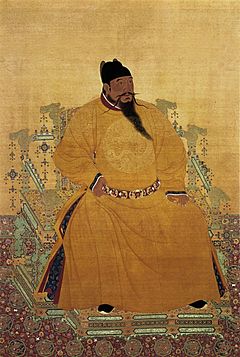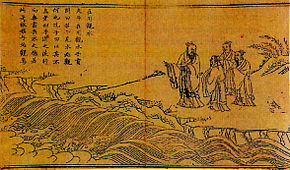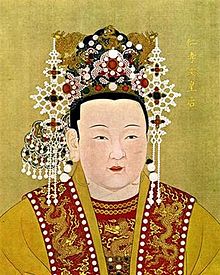Yongle Emperor
![]()
The title of this article is ambiguous. For other meanings, see Yongle (disambiguation).
Yongle (Chinese 永樂 / 永乐, pinyin Yǒnglè, W.-G. Yung-lo; * 2 May 1360 in Nanjing; † 12 August 1424 in Yumuchuan, Inner Mongolia) was the third emperor of the Chinese Ming dynasty, ruling the empire from 17 July 1402 until his death in 1424. His birth name was Zhū Dì (朱棣), his temple name Tàizōng (太宗 - "Supreme Ancestor"). The latter was changed to Chéngzǔ (成祖 - "Forefather of Completion") in 1538. Yongle was the fourth son of Emperor Hongwu.
The Yongle Emperor is considered the most important ruler of the Ming Dynasty and is counted among the most outstanding emperors in the history of China. He overthrew his nephew Jianwen from the throne in a civil war and took over the office of emperor himself. Yongle continued his father's policy of centralization, strengthening the institutions of the empire and founding the new capital city of Beijing. He pursued an expansive foreign policy and undertook several large-scale campaigns against the Mongols. To strengthen his influence in East and South Asia, he had a large fleet built and entrusted Admiral Zheng He with diplomatic missions.

Emperor Yongle
Youth
Zhu Di was born in 1360 as the fourth son of the future first Ming emperor Hongwu in his capital Nanjing. Officially, his mother was recorded as Empress Ma, but it is quite possible that a concubine named Gong was his biological mother. If so, she died shortly after giving birth, so the empress adopted the newborn Prince Zhu Di as her biological child. At the very least, there is no doubt that the prince's relationship with the empress was quite intimate, for after ascending the throne, Yongle elevated the empress mother to deity status and had temples built in her honor.
When Zhu Di was born, his father Zhu Yuanzhang was still a warlord of China, fighting for power while the Yuan dynasty was about to fall. With the final expulsion of the Mongol dynasty from China, he founded the Ming dynasty as Hongwu in 1368. During the coronation and founding ceremonies, Zhu Di and his brothers also played a role as extras. At the same time, Nanjing was elevated to the new capital of a unified China.
Hongwu strictly supervised the education of his sons. The crown prince Zhu Biao was given precedence, but since all Ming princes were educated together with the heir to the throne, they all received the same instruction. The master Kong Keren instructed the emperor's sons extensively in the Confucian classics and history as well as in philosophy and ethics. It is said that Yongle was particularly interested in the Qin and Han dynasties, and in later years he often recited quotations from the First Emperor and the famous Han emperors Gaozu and Wudi.
In 1370, Emperor Hongwu created imperial principalities for his sons on the borders of the empire. Thus, at the age of ten, Zhu Di was appointed Prince of Yan 燕王; that region in the north whose seat of government was the former Yuan capital of Dadu, now called Beiping (Northern Peace). As he was still too young, his father appointed a governor in Beiping at the same time as he handed over the Royal Seals of Yan to Zhu Di. Now the new Prince of Yan was given his own teachers to prepare him for his future task as Regional Prince of the North.

Confucius with pupils (letterpress, Ming period)
Prince of Yan
Even as a young man, the court considered Prince Zhu Di one of the Hongwu Emperor's most capable sons, who received special attention from his father. Zhu Di showed himself to be a gifted student with quick perception. He was of great athletic stature and fond of hunting, so his father enjoyed spending time with his fourth son. In 1376, the prince was married at the age of sixteen. He married Lady Xu, daughter of General Xu Da. The general had played a leading role in Hongwu's conquest of China and had now become not only the father-in-law of an imperial prince, but also Zhu Dis governor in Beiping and commander-in-chief of the northern armies.
In 1380, Zhu Di and his young family (the first son Zhu Gaozhi was born in 1378) moved from the capital Nanjing to Beiping in the principality of Yan. The prince now occupied the old palaces of the Mongol emperors, which his father had once had sealed. The residence was not in the best condition, but had similar dimensions to the imperial palace of Nanjing, which meant that the prince now resided far more splendidly than any of his brothers in the other principalities.
Zhu Di had obtained the most important of all principalities with Yan and also wanted to savour his new fullness of power. He created around him a staff of experienced advisors and sought to administer Yan in an exemplary manner. Still at his side was his father-in-law Xu Da, who had been staying in Beiping since 1371 and had developed the city into the main military base of the north. From there he had already undertaken several successful campaigns against the Mongols along the borders. The veteran general instructed Zhu Di in war tactics, military organization, and defensive strategy. As a result, the prince undertook maneuvers in northern China with the general year after year. To the emperor, Zhu Di was able to report successful, albeit small, expeditions to Inner Mongolia. General Xu Da fell seriously ill in 1384 and was recalled to Nanjing. He left his son-in-law a well-trained army of about 300,000 men, who now transferred their loyalty to the prince.
For nineteen years Zhu Di remained in Beiping and was able to show off a well-organized territory. During this time, the crown prince Zhu Biao, and later Zhu Di's other elder brothers, had died in 1392. The prince was thus in good hope of succeeding the old Hongwu emperor in office. But Hongwu had become increasingly capricious and unpredictable. He distrusted his numerous sons, and by now he did not exclude Zhu Di from this either. Zhu Di could not rely on his past good relations with his father. He waited to see who the old emperor would appoint as his designated successor. Contrary to his expectation, his father chose his grandson Zhu Yunwen.
In 1398, Emperor Hongwu died and his grandson ascended the Dragon Throne as Jianwen. The new reign got off to a bad start for the Prince of Yan, as the Jianwen Emperor expressly forbade his eldest uncle Zhu Di from attending his father's funeral ceremonies in Nanjing. This was not to be the only humiliation Zhu Di suffered at the hands of his nephew, the emperor. Numerous followed. The imperial court shared Hongwu's distrust of the influential princes on the borders of the empire, given their enormous military might and the vast financial resources they possessed. Emperor Jianwen and his advisors sought to reform the imperial system and significantly curtail the princes' powers. But this inevitably met with opposition from the princes. Zhu Di was the eldest member of the imperial clan, and it was to him that his brothers and nephews now turned to demand a decisive response. This was not inconvenient for Zhu Di, who saw himself as the rightful heir to the throne.

Zhu D's wife, the Lady Xu, court portrait as empress
Questions and Answers
Q: Who was the Yongle Emperor?
A: The Yongle Emperor was the 3rd emperor of the Ming part of China's history.
Q: What was his real name?
A: His real name was Zhu Di.
Q: How long was he the emperor of China?
A: He was the emperor of China from 1402 to 1424.
Q: Why is he considered important?
A: He is considered important because he moved China's capital to Beijing, built its Forbidden City, and sent Zheng He on trips to Indonesia, India, Arabia, and eastern Africa.
Q: When was the Yongle Emperor born?
A: The Yongle Emperor was born on May 2, 1360.
Q: When did he die?
A: He died on August 12, 1424.
Q: What was the purpose of sending Zheng He on his trips?
A: The purpose of sending Zheng He on his trips was to promote trade and establish Chinese presence in foreign countries.
Search within the encyclopedia